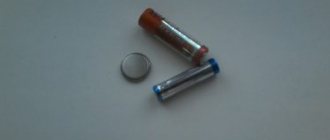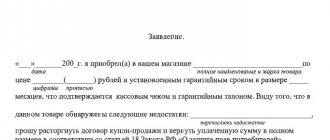Every person at least once in his life has encountered a situation where he needed to return a recently purchased product to a store. It is even possible that the seller refused to issue a return, citing store rules or laws. But is it likely that the seller in this case broke the law? To avoid being deceived by careless entrepreneurs and to be able to protect your rights, you need to know which goods cannot be returned. It’s not difficult to protect yourself - there are few such products, and they are divided into several categories.
Definition of the term “warranty period”
Dictionaries and legal literature offer the following options for defining the concept of “warranty period”:
- warranty period - a period of time during which the manufacturer of a product or its seller guarantees its compliance with the requirements of the contract, quality indicators, and passport data. A guarantee of normal uninterrupted operation, reliable operation, preservation of the required properties, and suitability for use during the warranty period is issued subject to compliance by the buyer or consumer with the conditions of storage and use of the product. Distinguish; a) the guaranteed shelf life of products, goods that tend to lose the necessary qualities during storage; b) the warranty period for the operation of products, goods (machines, equipment, devices, furniture) that change the qualities and properties they require in the process of industrial and domestic use; c) the guaranteed shelf life of goods whose consumer properties decrease over time. (Raizberg B.A., Lozovsky L.Sh., Starodubtseva E.B.. Modern economic dictionary. - 2nd ed., revised M.: INFRA-M. 479 p.. 1999.);
- guarantee period - in civil law, the period of time provided for by contract or law during which the manufacturer (performer, seller) guarantees that the product meets the quality requirements under the sales contract and preserves the consumer properties of the work performed or service provided. If defects in a product, work or service are discovered after the expiration of the warranty period, then, as a rule, the obligation of the manufacturer (performer, seller) to satisfy the consumer’s demands regarding the defects of the product (work, service) ceases. (Encyclopedia of Law. 2015.);
- warranty period - in civil law, the period of time during which the product must meet the quality requirements under the sales contract, and work and services must retain their consumer properties. Installed on products intended for long-term use or storage. The discovery of defects in a product, work or service after the expiration of the warranty period terminates (as a general rule) the obligation of the manufacturer (performer, seller) to satisfy consumer demands regarding defects in the product (work, service) (Articles 18 and 29 of the Law of the Russian Federation “On the Protection of Consumer Rights” dated February 7, 1993) (Big Legal Dictionary. - M.: Infra-M. A. Ya. Sukharev, V. E. Krutskikh, A. Ya. Sukharev. 2003.).
- The warranty period is the period of time during which the manufacturer, performer, seller, authorized organization or authorized individual entrepreneur, importer are responsible for any (simple, significant) defects of the goods, work, services, unless they prove that they arose after the transfer of the goods, the result of work to the consumer, due to the consumer’s violation of the rules of use, storage or transportation of goods, the result of work, actions of third parties or force majeure (Agafonova N.N. All about consumer rights. M.: Prospekt, 2021. P. 33.).
Establishing a warranty period is not mandatory. The warranty period is established by the manufacturer (performer) in its technical documentation (agreement with the consumer) and is calculated in time units.
Unlike the service life and shelf life, the warranty period can be established for any goods, is purely commercial in nature, and is a means of competition in the market.
The law does not directly determine the duration of the periods mentioned in Art. 5 of the Law on the Protection of Consumer Rights, as well as methods for determining their specific (absolute) duration.
The concept of “warranty period” in the Civil Code of the Russian Federation and the law on the protection of consumer rights
The warranty period is understood as the period during which, if a defect is detected in the product (work), the manufacturer (performer), seller, authorized organization or authorized individual entrepreneur, importer are obliged to satisfy the consumer’s requirements established by Art. Art. 18 and 29 of the Law (clause 6 of Article 5 of the Law on Protection of Consumer Rights).
Clauses 6 - 8 art. 5 of the Law “On the Protection of Consumer Rights” are interconnected with the norms of the Civil Code of the Russian Federation on the quality of goods.
Article 470 of the Civil Code of the Russian Federation “Guarantee of the quality of goods” determines the seller’s obligation to transfer to the buyer the goods, which must meet the requirements provided for in Art. 469 of the Civil Code of the Russian Federation. In this case, the conformity of the goods with these requirements is determined by the moment of transfer to the buyer, unless another moment of determining the conformity of the goods with these requirements is not provided for in the purchase and sale agreement, and within a reasonable period must be suitable for the purposes of its use.
According to paragraph 2 of Art. 470 of the Civil Code of the Russian Federation, if the purchase and sale agreement provides for the provision by the seller of a guarantee of the quality of the goods, the seller is obliged to transfer to the buyer the goods, which must meet the requirements provided for in Art. 469 of the Code, for a certain time established by the contract ( warranty period ).
It can be said that the norms of Art. 5 of the Law on the Protection of Consumer Rights on the warranty period and the corresponding norms of the Civil Code of the Russian Federation define the concept of a warranty period using its various characteristics. Taking into account the norm of paragraph 2 of Art. 470 of the Civil Code of the Russian Federation and the rules of paragraph 6 of Art. 5 of the Law, the warranty period of a product can be defined as the product’s compliance with the requirements provided for in Art. 469 of the Civil Code of the Russian Federation, for a certain time, before the end of which, in the event of a defect in the product, the manufacturer and seller are obliged to satisfy the consumer’s requirements established by Articles 18 and 29 of the Law on the Protection of Consumer Rights.
Types of product quality guarantee
The legal literature notes that the Civil Code of the Russian Federation distinguishes between two types of product quality guarantee provided by the seller to the buyer:
- legal guarantee (clause 1 of article 470 of the Civil Code of the Russian Federation);
- contractual guarantee (warranty period) (clause 2 of article 470 of the Civil Code of the Russian Federation).
A contractual guarantee of the quality of goods with a certain period of preservation of the quality of the goods has advantages. The warranty period is clearly established by the manufacturer; its duration does not depend on the discretion of the court.
Advantages of having a warranty period for a product
The undoubted advantage of having a warranty period for a product (work) is the rule: if the seller provides a quality guarantee, then during the warranty period the buyer is not required to prove that the defects of the product arose before its purchase. In this case, the seller is responsible for the defects of the goods unless he proves that the defects of the goods arose after its transfer to the buyer as a result of the buyer’s violation of the rules for using the goods or storing them, or the actions of third parties, or force majeure (clause 2 of Article 476 of the Civil Code of the Russian Federation).
The requirements established by Art. 18 of the Law on Protection of Consumer Rights, the following may be presented:
- during the warranty period for the product - in this case, the seller bears the burden of proving the absence of his fault;
- after the expiration of the warranty period , but within two years from the date of transfer of the goods to the consumer, while the burden of proving the seller’s guilt falls on the latter.
Thus, the distribution of the burden of proof depends on whether a warranty period was established for the product (work, service), as well as on the time of discovery of the defects: the defects arose before or after the transfer of the goods to the buyer.
○ What is a non-exchange item?
This is a product included by the legislator in the list of products that the seller is not obliged to accept from the consumer if the latter has no complaints about the quality. That is, the rule according to which purchases that are unsuitable in shape, style, size, or color can be returned to the store does not work here.
Features of the exchange of such goods:
- They can be returned to the store only with the consent of the seller.
- The range of such goods is clearly defined by the legislator.
- Exchange is possible if a defect is identified.
If there is a shortage of goods, special rules may apply for exchange and return (we are talking about technically complex products).
The warranty applies to the product with components
According to paragraph 3 of Art. 470 of the Civil Code of the Russian Federation, the warranty period applies (unless the manufacturer determines otherwise) to all parts that make up the product (the so-called components).
Paragraph 2 of paragraph 3 of Article 19 of the Law contains a rule regulating situations when the warranty periods for the main product and its components do not coincide. Thus, the consumer has the right to make claims related to product defects discovered during the longer of these periods, regardless of where exactly the defect was discovered - in a component of the main product or its components.
However, it should be borne in mind that in the event of claims related to defects in an element of the product for which the warranty period has expired, the consumer will need to prove the seller’s guilt in the occurrence of such defects.
○ Advice from a lawyer:
✔ My wife bought earrings, but a week later the clasp broke off. Is it possible to exchange earrings if they are considered to be of poor quality, despite the fact that these products cannot be returned?
Yes. It is allowed to return a defective item to a store, even if it is included in the List of Products that cannot be returned. You must contact the seller, pointing out the defect in the product. All expenses for the examination must be covered by the store, so you will not lose anything. If you did not violate the rules for using jewelry, you will be required to replace, repair, or return the money for it.
Deadlines for detecting product defects and the start of the warranty period
Clause 1 of Art. 19 of the Law, as well as Art. 477 of the Civil Code of the Russian Federation establishes a rule according to which the right to make claims regarding the inadequate quality of a product arises from the consumer if the defect is discovered during the warranty period or expiration date .
In other words, the consumer can make demands to replace the product, make warranty repairs to the product, reimburse the costs of eliminating defects, reduce the price or return the price paid for the product if defects in the product are discovered within the warranty period or its expiration date.
But the absence of these deadlines does not deprive the consumer of the right to present claims under Art. 18 of the Law “On Protection of Consumer Rights”. Paragraph. 2 p. 1 art. 19 of the Law establishes for these cases a maximum two-year period for detection of defects, calculated from the day the goods are transferred to the consumer, unless longer periods are established by other laws or an agreement. This rule must be applied together with the rule in paragraph. 1 clause 6 art. 18 of the Law, which states that the burden of proving the causes and time of occurrence of a defect in the absence of a warranty period is placed on the consumer.
In para. 2 p. 1 art. 19 of the Law uses the term “reasonableness of time”, which depends on the characteristics of the product itself. Thus, for perishable goods and durable goods, the reasonableness of the period for detecting defects within two years will be different.
The beginning of the warranty period of a product is considered to be the moment the product is transferred to the buyer, unless otherwise provided by the purchase and sale agreement (Article 471 of the Civil Code of the Russian Federation, clause 2 of Article 19 of the Law).
The warranty period for so-called seasonal goods (for example, shoes) is calculated differently: the beginning of the warranty period is recognized as the moment the corresponding season begins. The specific timing of the onset of seasons is determined by the constituent entities of the Russian Federation, taking into account the specifics of their climatic conditions.
For example, the Moscow Government adopted Resolution No. 466-PP dated July 16, 2013 “On establishing the timing of the onset of seasons for calculating the warranty periods and service life of seasonal goods in the city of Moscow.” The specified Resolution of the Moscow Government established the following dates for the onset of seasons for calculating the warranty periods and service life of seasonal goods in the city of Moscow:
- winter season - from November 1;
- spring season - from March 1;
- summer season - from May 1;
- autumn season - from September 1.
When selling goods by samples, by mail, as well as in other cases when the moment of concluding a sales contract and the moment of transfer of the goods to the consumer do not coincide, the warranty period and service life are calculated from the day the goods are delivered to the consumer (paragraph 3, clause 2, art. 19 of the Law). In addition to the sale of goods based on samples, distance selling is possible (see Article 26.1 of the Law).
If the consumer is deprived of the opportunity to use the product due to circumstances depending on the seller (for example, the product requires special installation, connection or assembly, or has defects), the warranty period does not run until the seller eliminates such circumstances. If the day of delivery, installation, connection, assembly of goods, elimination of circumstances dependent on the seller, due to which the consumer cannot use the goods for their intended purpose, cannot be determined, the warranty period is calculated from the date of conclusion of the purchase and sale agreement (paragraph 3, paragraph 2, article 19 Law).
Various options for the start of the warranty period and service life are subject to a general idea - they begin to flow from the day when the consumer received a real opportunity to use the thing and extract useful properties from it.
Repair under warranty
The consumer rights protection law establishes the consumer's right to warranty repairs as an additional obligation of the seller. Accordingly, repairs that can be carried out during the warranty period will be called warranty repairs.
Application procedure
If after purchase any defects were discovered, or the product failed through no fault of the consumer, in this case you need to contact the store where the product was purchased and write an application for warranty repair.
Such a statement can be drawn up in any form, but it should indicate:
- Date of purchase;
- Information about the buyer (full name, phone number, etc.);
- Address of the store where the product was purchased;
- Data about the product being delivered (model, brand, serial number, etc.);
- Product warranty period;
- Describe in detail the circumstances under which the defect was discovered;
- The purpose of delivery of goods is repair or quality control;
- Date and time of delivery of the goods.
So that in the future the consumer can document the fact of handing over the goods for repair, it is advisable to insist that a transfer and acceptance certificate be drawn up in 2 copies. The act must indicate:
- Date of purchase;
- Who purchased the goods (full name of the buyer)
- Product defects;
- What comes with the product;
- Condition of the goods at the time of receipt (all visible damage (chips, cracks);
- Sometimes you may need payment documents or checks (in this case, you should make copies of the checks for yourself and keep them).
The certificate should be kept until the repair is completed and the item is returned.
Unfortunately, there are common cases when a store seller refuses to accept a product under warranty, citing the fact that you should contact the manufacturer’s service center for free repairs. This behavior of the store is illegal, since the buyer retains the right to choose who to contact for repairs. The presence of a sales receipt is a circumstance that obliges the seller to fulfill the warranty obligations assumed.
Product examination
In some cases, it may be necessary to conduct an examination of the goods. This may occur when the seller suspects that the breakdown was the fault of the buyer. The period for conducting the examination should not exceed 20 days.
The consumer is also not deprived of the right to conduct his own independent examination, so that if the store refuses to carry out repairs at his own expense, he can prove in court the fact that the defects of the product were not his fault and this case is covered under warranty. In this case, the independent expert’s opinion will be written proof of his innocence.
The seller will also be required to reimburse the buyer's expenses for conducting an independent examination.
Warranty repair period
The law does not require a written deadline for repairing the product. This remains at the discretion of the parties (seller and buyer). However, if such a period was not specified, and the consumer nevertheless asked a question regarding the defects of the product, then these defects must be eliminated immediately, that is, within the minimum period that is objectively required for their elimination, subject to repair in the usual way.
If the parties decide to prescribe a period for repairs, then the maximum period cannot exceed 45 days. Here the question may arise: what days are we talking about - calendar days or working days?
According to the general rule established by law, if there is no indication of working days, they will be calculated in calendar days.
Consumer rights when returning goods for repair under warranty
If the repair period lasts longer than the established period, the consumer has the right:
- demand payment of a penalty, which is 1% of the price of the goods, for each day of delay;
- replace the product with a similar one during the repair period;
- refuse the goods and demand a refund.
When handing over a durable product for repair, the consumer has the right to demand that a similar product be provided in return. The seller is obliged to fulfill such a requirement by virtue of the direct instructions of the law (Clause 2 of Article 20 of the Law on the Protection of Consumer Rights).
This requirement can be rejected by the seller only if it concerns a product that cannot be replaced with a similar product during the repair period. The list of such goods was approved by Government Decree No. 2463 dated December 31, 2020. This list includes: cars, motorcycles, electrical appliances (microwave, electric razor, hair dryer, etc.), furniture, civilian weapons, jewelry.
Warranty period after repair
The warranty period after repair is extended for the period during which the product was not used and was under repair.
This period is calculated from the day the consumer applied for repairs until the day of issue after repairs.
After the repair, at the time of issue, the consumer is given documents that must contain the following information:
- date of application for repair;
- date of delivery of the goods for repair;
- date of repair, with a detailed description of the defects of the product eliminated;
- whether any spare parts or components were replaced;
- date of delivery of the repaired product to the consumer.
Warranty period for work performed (services)
Requirements related to deficiencies in the work performed (service provided) may be submitted by the consumer:
- upon acceptance of the work performed (service provided);
- during the performance of work (provision of services).
The procedure for acceptance by the customer of work performed by the contractor is set out in Art. 720 Civil Code of the Russian Federation.
In the event that it is impossible to detect deficiencies at the time of acceptance of the work performed (service provided), claims can be made within the time limits established by clause 3 of Art. 29 of the Law on Protection of Consumer Rights.
The consumer has the right to make claims related to deficiencies in the work performed (service provided) if they are discovered:
- during the warranty period;
- in the absence of a warranty period, within a reasonable period, within 2 years from the date of acceptance of the work performed (service provided) or 5 years in relation to defects in the structure and other real estate.
The result of the work is a tangible result for which a warranty period can be established (for example, a tailored suit, repaired shoes, household appliances, watches, etc.). It seems that this concept can also be applied to services that have a tangible (material) result (for example, medical services related to prosthetics, manicure services, certain types of hairdressing services, etc.).
In accordance with paragraph 4 of Art. 29 of the Law on the Protection of Consumer Rights, two situations should be distinguished:
- when the contractor has not established a warranty period for the result of the work (service) . In this case, the contractor is responsible for the defects only if the consumer proves that they arose before he accepted the work (service) or for reasons that arose before that moment;
- when the guarantee period is established . In this case, the burden of proving the cause of the defects lies with the contractor. The contractor must prove that the defects arose after the consumer accepted the work (service) as a result of his violation of the rules for using the result of the work (service), actions of third parties or force majeure. If the contractor cannot prove this, then he will have to bear responsibility for the shortcomings of the work (service).
List of goods from the resolution
Decree of the Government of the Russian Federation No. 55 contains a very specific list that describes all categories of goods of good quality, which will be impossible to return to the store. In some cases, when a product, for example, is defective or must be returned due to the fault of the store, it is still possible to return it.
The following cannot be returned:
- Medications. These also include products for personal hygiene and self-care. Signs remind you of the impossibility of returning medications in pharmacies. So, if you bought the wrong pills, then you will have to spend money again to purchase the product you need: they will not cancel it for you. But even with medicinal products there are exceptions. For example, you can return child care products, medical devices, dental hygiene products and vision lenses.
- Products made of polymers intended for contact with food and its storage (disposable plates, spoons, cups, carrying containers, kitchen utensils made of polymers).
- Household and technical chemicals.
- Materials sold by the meter - fabric, building materials, etc.
- Textiles and underwear (underwear). An exception has been made for outerwear and shoes - they are required to be changed in stores if there is a reason to do so.
- Household furniture, furniture sets, sets.
- Jewelry and all products containing precious stones and metals, such as luxury goods.
- Hygienic products. The store will not be able to accept returns of cosmetics and perfumes, hair care products, toothbrushes and other hygiene items.
- Automobile, motorcycle and bicycle goods and watercraft.
- Complex household appliances that have warranty repair periods.
- Any weapons and related products.
- Plants and animals.
- Non-periodic printing.
It is also worth noting that discounted items cannot be exchanged or returned. As a rule, a discount occurs due to some kind of defect or defect. The store has the right to sell such goods at a special, attractive price, but is obliged to warn customers about what exactly is wrong with their purchase and stipulate in advance that a return will not be possible. Only if a defect is discovered that was not specified by the seller, can you try to appeal the transaction.
Promotions and discounts can work in a similar way.
Consumer requirements when significant deficiencies in the work (service) are detected
Clause 6 of Art. 29 of the Law on the Protection of Consumer Rights is devoted to the actions of the consumer when he discovers significant deficiencies in the work (service).
In this case, the consumer will have the right to make a demand to the contractor for the free elimination of detected deficiencies . In this case, the consumer bears the burden of proof that the defects arose before his acceptance of the result of the work (service) or for reasons that arose before that moment.
At the same time, conditions are provided under which a demand can be made for the gratuitous elimination of detected deficiencies: if such deficiencies are discovered after 2 years (5 years in relation to real estate) from the date of acceptance of the result of the work (service), but within the established limits for the result of work (service) service life or for 10 years from the date of acceptance of the result of work (service) by the consumer, if the service life is not established.
If this consumer requirement is not satisfied within 20 days from the date of its presentation by the consumer or the detected defect is irreparable, the consumer, at his choice, has the right to present one of the following requirements:
- a corresponding reduction in the price for the work performed (service provided);
- reimbursement of expenses incurred by him to eliminate deficiencies in the work performed (service provided) on his own or by third parties;
- refusal to fulfill the contract for the performance of work (provision of services) and compensation for losses.





